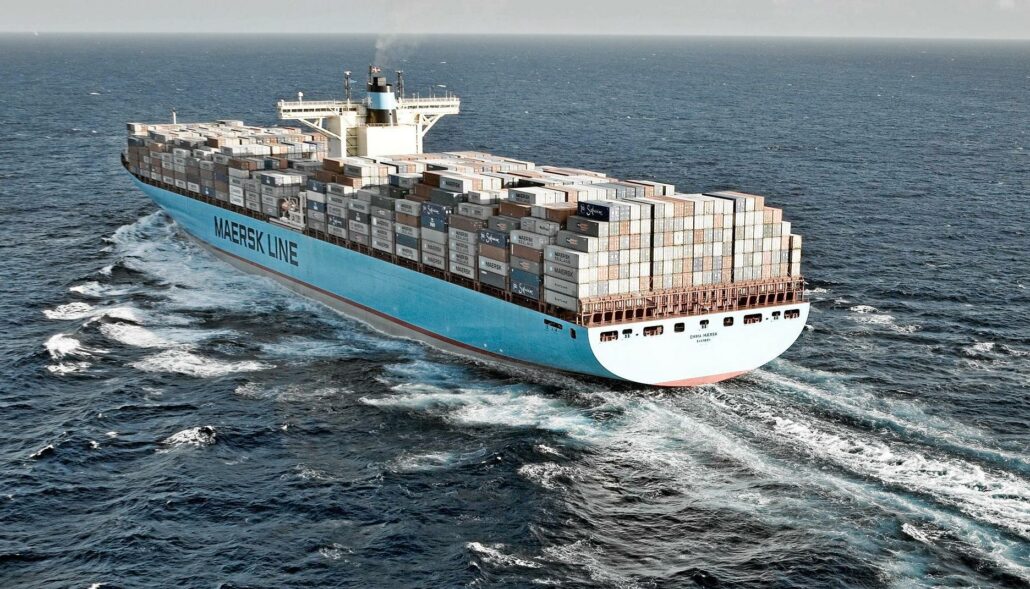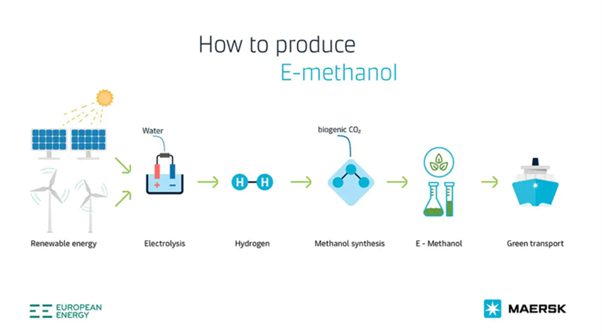
Shipping giant Maersk plots course to e-methanol, stands by to drop diesel
Marine operator AP Moller Maersk has advanced plans to strip carbon out of its globe-spanning freighters, placing orders this week for up to twelve container ships powered by e-methanol.
The innovative fuel variant is derived from green hydrogen, electrolysed by carbon-free renewable electricity, and then synthesised in association with biogenic carbon dioxide. (see diagram).

Last week the Danish shipping line confirmed plans to build a production plant in its home country, capable of producing 10,000 tonnes of e-methanol per year. RE-Integrate, the line’s joint venture with Danish clean fuel producers European Energy, will run the plant after an opening set for 2023.
A solar farm in Kassø, southern Denmark, will provide clean electricity for the plant’s electrolysis. The new facility will be RE-Integrate’s third e-methanol plant in the country, and its biggest.
That announcement included news that Maersk would use the plant to source fuel for its first container vessel burning e-methanol.
This week the line went further, announcing its orders worth $1.4 billion with Hyundai Heavy Industries initially for eight new ocean-going freighters, “capable” of using the fuel. Four more vessels may follow after 2024.
Designed to replace ageing ships, Maersk’s greening fleet will operate at first on a ‘dual-fuel’ basis. Low- sulphur diesel burnt in engine rooms will be a bridge to 100% e-methanol operation, set to become the ships’ default mode once global bunkering infrastructure permits.
The operator calculates that once in operation, the initial eight freighters collectively can save one million tonnes of carbon each year.
Around 170 metres in length, and able to carry over 2,000 standard containers, the first ships will go into service on Maersk’s Sealand-branded routes around the North Sea and the Baltic.
AP Moller Maersk believes more than half of its largest 200 customers have either set or committed to setting net-zero targets.
Henriette Hallberg Thygesen, CEO of its Fleet & Strategic Brands division, predicted, “This type of partnership could become a blueprint for how to scale green fuel production through collaboration with partners across the industry ecosystem. It will provide us with valuable experiences as we progress on our journey to decarbonise our customers’ supply chains”.
European Energy’s CEO Knud Erik Andersen commented, “We’re proud to be a part of the first large scale e-methanol production in Denmark”.
” While renewable energy is becoming more and more common in electricity, this is one of its first steps in heavy transportation. This agreement marks a milestone in the journey towards green transition in the shipping industry”.
End.
Green Infrastructure Week curates’ content from the entire ecosystem around green infrastructure from government and NGOs to respected commentators.
Feel free to share this content with your social media community using #GreenInfrastructureWeek
During Green Infrastructure Week we will host a programme of live and exclusive free-to-attend webinars.